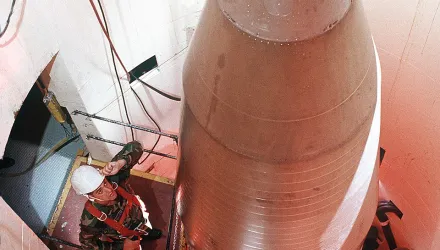
The Chinese-mediated agreement between Saudi Arabia and the Islamic Republic of Iran is a positive development in the sense that it may help to regulate the conflict between two of the region's heavyweights and thus promote stability in the Middle East. But it is neither a regional game-changer nor the beginning of a beautiful friendship between Tehran and Riyadh.
The Middle East is today characterized by a deep geopolitical competition over the region's political order and orientation. This reality is the result of the failure, over the past two and a half decades or so, to establish a Western-oriented regional order on the one hand, and the rise of a regional strategic camp seeking to introduce an anti-Western order, whose core values are "resistance" to U.S. influence and the rejection of Israel's existence, on the other hand.
Led by Iran, the "axis of resistance" has indeed shifted the regional balance of power in a way that is perceived as a threat to the core interests of the established powers in the region—including Israel and Saudi Arabia. Iran did not initiate the various developments that have shaped the region's politics in recent decades, including the collapse of the Arab-Israeli peace process, the U.S. War in Iraq, the so-called Arab Spring and the subsequent rise of the Islamic State. But it harnessed the opportunities created by these shockwaves in the service of establishing unprecedented influence in the Middle East—a region Iran has tellingly rebranded as "west Asia."
It was against this backdrop that in 2016, President Barack Obama famously advised both "our friends" and the Iranians "to find an effective way to share the neighborhood and institute some sort of cold peace." This prognosis meant that Iran's rivals had to internalize that Iran had established a critical mass as a strategic force to be reckoned with. Neither Obama's successor, nor Saudi Arabia or Israel were receptive to this idea. Seven years later, not only has Iran survived the Trump administration's "maximum pressure" campaign and its own domestic disturbances, but it has come to pose an even greater threat to its opponents and is ever-closer to a nuclear weapon. Nothing in the recent agreement will change Saudi Arabia's perception of the threat posed to it by Iran's capabilities and hegemonic adrenalin. Nor will the agreement stop Iran's quest for strategic depth and a more robust deterrent.
While the recent agreement likely reflects a growing realization on the part of Saudi Arabia of this strategic reality, and of its own limitations in places like Syria, Lebanon, and Yemen, it does not eliminate the long-term geopolitical competition in the region. Rather, it is likely a step in a process that will exhibit hurdles and stumbles but will ultimately result in a new equilibrium in the region. How this process is affected by the competition on the global level over the international order remains to be seen.
Lastly, the agreement's impact on local conflicts will also be limited. While the conflicts in Yemen, Iraq, Syria, Lebanon, and the Gaza Strip reflect on the overarching geopolitical power struggle, these conflicts are animated by their own local, particular logics, interests, and considerations.
Statements and views expressed in this commentary are solely those of the author and do not imply endorsement by Harvard University, the Harvard Kennedy School, or the Belfer Center for Science and International Affairs.
Sobelman, Daniel."Saudi-Iranian Agreement is a Positive Development, but not a Game-changer." Belfer Center for Science and International Affairs, Harvard Kennedy School, March 16, 2023.





